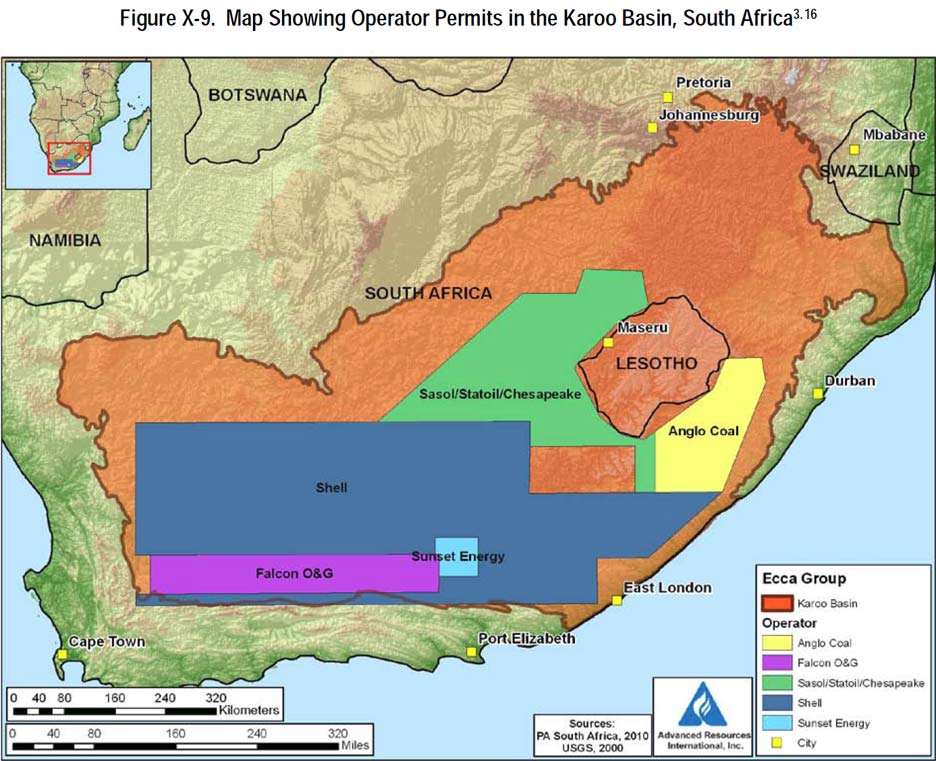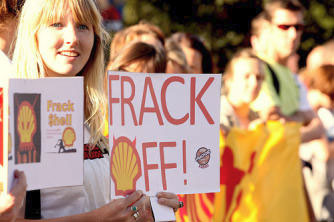(Stop Fracking British Columbia)
[email protected]
(Originally posted on April 25, 2011 - Updated April 27, 2011)
SOUTH AFRICA'S APRIL 21, 2011 MORATORIUM ON FRACKING
(Mega Disturbing Question: Why no public inquiry or
cessation of fracking in British Columbia?)
[email protected]
(Originally posted on April 25, 2011 - Updated April 27, 2011)
SOUTH AFRICA'S APRIL 21, 2011 MORATORIUM ON FRACKING
(Mega Disturbing Question: Why no public inquiry or
cessation of fracking in British Columbia?)
Treasure the
Karoo Action Group
http://treasurethekaroo.blogspot.com/
Karoo Anti Hydraulic Fracturing Action Network
http://kahfan.blogspot.com/
Informing South Africa about Exploitive Gas Drilling
http://www.fractual.co.za
Stop Fracking The Karoo
http://www.stopfracking.co.za/
http://treasurethekaroo.blogspot.com/
Karoo Anti Hydraulic Fracturing Action Network
http://kahfan.blogspot.com/
Informing South Africa about Exploitive Gas Drilling
http://www.fractual.co.za
Stop Fracking The Karoo
http://www.stopfracking.co.za/
Collection of
Media
articles, and related
information on fracking in South Africa
(Pdf file - 2.7 Megabytes)
information on fracking in South Africa
(Pdf file - 2.7 Megabytes)
In the fracking
debacle, the (South African) state has been
conspicuous by its absence. The entire debate has been driven by a
spontaneous
groundswell of civil society action. There has been virtually no
response by
municipalities, provincial governments or national government (although
Water
Affairs Minister Edna Molewa belatedly spoke out against fracking). Why
did the
Department of Mineral Resources not consult provinces or municipalities
beforehand? Was there consultation with the Department of Water
Affairs, or the
Department of Environmental Affairs, or the Department of Tourism? Or
if such
consultations took place beforehand (which is unlikely), why was civil
society
not invited? (Source: Doreen
Atkinson -
Trustee of the Karoo Development Society - Feburary 8, 2011, in Business
Day.)
Since late 2009, the following African-based and international corporations (in date order of application, below) were given introductory Technical Cooperation permits ("desktop studies") by the Petroleum Agency of South Africa (PASA) to scope out fracking in South Africa's Karoo deep shale gas basins which together extend some 700 miles, or over 1,000 kilometres:
- Sunset Energy, renamed as Challenger Energy Ltd. (bought out Bundu Gas & Oil Exploration, a company that was ordered to stop drilling through court action) - 3,100 square kilometres;
- Falcon Oil & Gas (Denver-Colorado) - 30,000 square kilometres, with an application to prospect for shale gas on 2,500 farms;
- Royal Dutch Shell's, Shell Exploration Company B.V. (Shell has shale gas tenures in British Columbia, and large shale gas investments world-wide) - 90,000 square kilometres;
- (joint application group) South African Sasol's Sasol Petroleum International, Norway's Statoil ASA, and Oklahoma's Chesapeake - 88,000 square kilometres;
- Anglo Coal (subsidiary of Anglo American).

The South African Karoo Basins area is northeast of Cape Town, north of Port Elizabeth, southwest of Johannesburg, and north and northwest of the port town of East London, where the series of five block exploration permits were granted since 2009.
The South African Mineral and Petroleum Resources Development Act (2002) states that a proponent may not explore or commence work for petroleum resources without an approved Environmental Management Program, an Exploration Right, and without Notifying and Consulting Landowners or Lawful Occupants of the Land in Question. Shell, Falcon Oil, Sunset Energy have recently provided Environmental Management Plans to PASA.
Following great public concern and opposition since January 2011 when three company proponents filed Environmental Management plans, the South African government eventually declared a moratorium on fracking at a Cabinet meeting on April 21, 2011:
Cabinet
has
endorsed
the
decision by the Department of Minerals
to invoke
a moratorium on licenses in the Karoo where fracking is
proposed. The Department of Minerals will lead a multi
disciplinary
team including the Departments of Trade & Industry, Science and
Technology, amongst others, to fully research the full implications of
the proposed fracking. Cabinet has made it very clear that clean
environment together with all the ecological aspects will not be
compromised.
In a April 21, 2011 Reuters news article, Cabinet spokesperson Jimmy Manyi stated that the moratorium would be honoured until there is conclusive evidence that there will be no unintended consequences on the environment.
The news source, News24, provided a clear rendering in an article on April 26, 2011, No 'fracking confusion' in SA, on the implications of the government's decision about the moratorium, with a quote by specialist energy attorney Dr. Luke Havemann:
It
would be a foolish step to appoint a multi-disciplinary task team to
delve into the issue of environmental degradation yet simultaneously
allow for hydraulic fracturing to be authorised and undertaken.
Such an approach would not amount to a risk-averse and cautious approach and as such would constitute a breach of a cardinal principle of our environmental law.
It follows that the relevant task team must complete a comprehensive assessment of the risks posed by fracking before any decision can be made in relation to any application for authorisation to conduct hydraulic fracturing, and therefore that the intention of Cabinet's vote is absolutely clear in putting a halt to fracking at this time.
Such an approach would not amount to a risk-averse and cautious approach and as such would constitute a breach of a cardinal principle of our environmental law.
It follows that the relevant task team must complete a comprehensive assessment of the risks posed by fracking before any decision can be made in relation to any application for authorisation to conduct hydraulic fracturing, and therefore that the intention of Cabinet's vote is absolutely clear in putting a halt to fracking at this time.
As one of a number of issues and reports responsible for the Cabinet's decision, was the issuance of a 100-page study, A Critical Review of the Application for a Karoo Gas Exploration Right by Shell Exploration Company B.V. The report, undertaken for Treasure the Karoo Action Group, was compiled by specialist energy attorney Dr. Luke Havemann, Institute of Marine & Environmental Law professor Jan Glazewski, and environmental consultant Susie Brownlie. The study was released on April 5, 2011 and submitted to Golder Associates (Africa), a global consulting firm under hire by Royal Dutch Shell to conduct its Environmental Management Plan. Golder Associates, is a Canadian company formed in 1960, and has over 160 offices on 6 continents.
100-Page study
- Critical Review of Shell's Exploration Right
http://royaldutchshellplc.com/wp-content/uploads/2011/04/Karoo4.pdf
http://royaldutchshellplc.com/wp-content/uploads/2011/04/Karoo4.pdf
YouTube -
Critical Review of Shell's Draft EMP
http://www.youtube.com/watch?v=WCgKBIXFNdQ&feature=player_embedded#at=29
http://www.youtube.com/watch?v=WCgKBIXFNdQ&feature=player_embedded#at=29
In section 18 of their report,
 Legislative Context,
it
states
that
Shell's
fracking proposal is in large non-compliance
with the government's
sustainable development legislation:
Legislative Context,
it
states
that
Shell's
fracking proposal is in large non-compliance
with the government's
sustainable development legislation:When
considered in the context of South Africa’s environmental legislative
framework, the draft
EMP
demonstrates
significant
non-compliance
with the national environmental
management
principles
for
sustainable
development
set out in the National
Environmental Management Act 1998 (‘NEMA’).
The
NEMA
principles
have been embraced by the Minerals
and
Petroleum Development Act 28 of 2002.
In this regard, this
Critical Review highlights the following concerns:
a. It is questionable that the
proposed activity represents the ‘best practicable environmental
option’
for
the
affected
area, especially in the absence of comparison with
alternative
land
uses (including alternative
energy generation options);
b. There is insufficient information on potential health risks of potential public health consequences as a result of water contamination;
c. There is an unacceptable risk of losing globally unique biodiversity, jeopardising ecological integrity and causing loss of irreplaceable resources for which remedy is not feasible;
d. There is an unacceptable risk of having an irreversible negative impact on the sense of place of the Karoo and on the lives, health and livelihoods of its communities;
e. There is a substantial risk of inequitable distribution of impacts arising from the proposed activity, and of vulnerable rural people having to bear the negative impacts; and
f. In the light of significant uncertainties there is a need to take a risk-averse and cautious approach.
b. There is insufficient information on potential health risks of potential public health consequences as a result of water contamination;
c. There is an unacceptable risk of losing globally unique biodiversity, jeopardising ecological integrity and causing loss of irreplaceable resources for which remedy is not feasible;
d. There is an unacceptable risk of having an irreversible negative impact on the sense of place of the Karoo and on the lives, health and livelihoods of its communities;
e. There is a substantial risk of inequitable distribution of impacts arising from the proposed activity, and of vulnerable rural people having to bear the negative impacts; and
f. In the light of significant uncertainties there is a need to take a risk-averse and cautious approach.
An April 4, 2011 article written
 by Cape Times'
Heather Dugmore, Fracking plan
fatally flawed, attorney
Derek Light, acting on
behalf of "hundreds of farmers, landowners, community members,
businesses and organisations in the Karoo", stated:
by Cape Times'
Heather Dugmore, Fracking plan
fatally flawed, attorney
Derek Light, acting on
behalf of "hundreds of farmers, landowners, community members,
businesses and organisations in the Karoo", stated: Both
Shell
and
Golder
Associates - the environmental consultancy
commissioned by Shell to compile its Environmental Management Plan -
have risked losing their professional integrity by presenting a fatally
flawed document as an environmental management plan.
Golder &
Associates - Africa - Documents List Link
http://www.golder.com/af/en/modules.php?name=Pages&sp_id=1236
http://www.golder.com/af/en/modules.php?name=Pages&sp_id=1236
SRK Consulting
- Falcon Oil Documents
http://www.srk.co.za/English/News_&_Media/Public_Documents/Falcon_Oil_&_Gas_Petroleum_Exploration_Right_–_Environmental_Management_Programme_Report/EMP/English
PASA - Exploration Activities Map
http://www.petroleumagencysa.com/Libraries/hub_maps/Hubmap_03-11.sflb.ashx
http://www.srk.co.za/English/News_&_Media/Public_Documents/Falcon_Oil_&_Gas_Petroleum_Exploration_Right_–_Environmental_Management_Programme_Report/EMP/English
PASA - Exploration Activities Map
http://www.petroleumagencysa.com/Libraries/hub_maps/Hubmap_03-11.sflb.ashx
An April 5, 2011 article by Geraldine Bennett, Light's Switched On, (see link at top of this page for media articles and information) states that attorney Derek Light, acting on behalf of many residents in the Karoo Basin, is opposing three shale gas applications by Shell, Sunset Energy (formerly Bundu Gas & Oil), and Falcon Oil.
Though Shell has received the bulk of public flack over its intentions to frack three separate, but connected, 30,000 square kilometre parcels of lands in South Africa, with the other fracking applicants receiving less media attention, Shell , Statoil and GDF Suez have recently been the focus of attention by the European press (in the United Kingdon's Guardian, April 20, Fossil fuel firms use 'biased' study in massive gas lobbying push) for instigating a public relations campaign to promote European use of non-renewable fracked natural gas and to reject investments in renewable wind and solar energy:
Central
to
the
lobbying effort is a report
claiming that the EU could meet its 2050 carbon targets €900bn more
cheaply by
using gas than by investing in renewables. But the Guardian has
established
that the analysis is based on a previous report that came to the
opposite
conclusion – that renewables should play a much larger role. The report
being
pushed by the fossil fuel industry has been disowned by its original
authors
who referred to it as " biased" in favour of gas.
For
the
last
two months, company lobbyists have
been besieging government officials in Europe, the US and
elsewhere to push the report. Their efforts are being boosted through
alliances
with energy-intensive industries, which are joining in the pressure on
government in the hope of securing cheap energy.
In the introductory section of the 100-page April 5, 2011 South African report, called The International Context, it summarized the following public review and concern processes in France, the United Kingdom, eastern Canada and the United States (but not Germany):
Fracking has raised major concerns world-wide for a wide-variety of reasons amplified in the main body of the report below.
The United States of America:
The Environmental
Protection Agency is engaged at the Federal level in an environmental
impact study on hydraulic fracturing. At the state level: New York
State placed a moratorium on hydraulic fracturing in December 2010; the
state of Maryland has placed a moratorium on drilling in March 2011
until the Department of the Environment completes a two-year study on
the impacts on drinking water and public health; the state of New
Jersey declared itself a ‘no fracking’ zone in March 2011.
The United Kingdom:
1. Proposed fracking in the UK has
very recently been subject to a major study known as the Tyndall Report,
as
well
as
an
enquiry by the House of Commons, before the Energy and
Climate Change Committee, (“the E&CCC enquiry). Amongst other
things the Tyndall Report notes that ‘...there is a real paucity of
information on which to base an analysis of how shale gas could impact
on GHG emissions and what environmental and health impacts its
extraction may have’; that there is a clear risk of contamination of
groundwater from shale gas extraction; that it is important to
recognise that most problems arise due to errors in construction or
operation and these cannot be eliminated. It also notes that ‘very
significant’ amounts of water are required to extract shale gas and
this could put severe pressure on water supplies in areas of drilling;
the impacts of climate change may further exacerbate this problem.
2. The Tyndall Report continues:
‘..in itself, this lack of information can be seen as a finding, as
along with the growing body of evidence for ground and surface water
contamination from the US and the requirement for the application of
the precautionary principle in the EU; shale gas extraction in the UK
must surely be delayed until clear evidence of its safety can be
presented.’ The Report goes on to say that with the considerable
uncertainty surrounding the environmental impacts of shale gas
extraction, ‘it seems sensible to wait for the results of the US EPA
investigation to bring forward further information’.
3. The UK’s Energy and Climate
Change Committee (“the E&CCC”) recently held
an inquiry into the exploration for and exploitation of shale gas. As
regards the harmful nature of the chemicals used in
fracking, it was noted “that there could be some
issues of mobilization of chemicals within the shale to
surface
and
ground
waters.
That is one of the reasons, of course, that
the inquiry in the States by the EPA has been
undertaken. Again, it would seem a wise thing to
do to investigate that.”
Canada:
In Canada the
authorities commissioned the ‘BAPE’ report in reaction to the high
percentage of wells drilled recently by the shale gas industry, which
exhibited problems relating to sealing in Québec province. Among
other things the report notes the paucity of scientific studies in
Canada, the United States or elsewhere to assess the impacts of
drilling with hydraulic fracturing on groundwater. The Commission
made
a
number
of
recommendations, which are also pertinent to the Shell
proposal. These include: that the use of chemical additives for which
the environmental or health-related risks cannot be assessed, or which
may present a risk, in the water used for hydraulic fracturing should
be prohibited; that it would be appropriate to
assess the long-term risk associated with the presence of contaminated
water from hydraulic fracturing activities in rock formations; that a
study of the cumulative impacts of the disposal of wastewater from the
shale gas industry be undertaken. The Commission also pointed out that
a high percentage of unexpected natural gas
emissions observed from wells pose a risk of explosion, and little is
known about the seismic risks associated with the industry. The report
stated that a strategic
environmental assessment of the cumulative impacts was seen to
be ‘a necessary element of both an informed decision and improved
social acceptability’.
France:
On 14 March 2011,
France extended a moratorium on shale gas exploration until
June
2011
at
which
time two official reports are due to be published on
the economic, social and environmental impacts
of the exploration for, and exploitation of,
shale gas. The extension of the moratorium comes just days after the
French
Prime Minister, Francois Fillon, imposed a ban on drilling for unconventional oil and gas until mid-April, at which time a preliminary risk report is expected. The moratorium was extended primarily to allow for more time to properly explore the environmental risks associated with shale gas exploration and follows rigorous protests against shale gas exploration in France.
Prime Minister, Francois Fillon, imposed a ban on drilling for unconventional oil and gas until mid-April, at which time a preliminary risk report is expected. The moratorium was extended primarily to allow for more time to properly explore the environmental risks associated with shale gas exploration and follows rigorous protests against shale gas exploration in France.